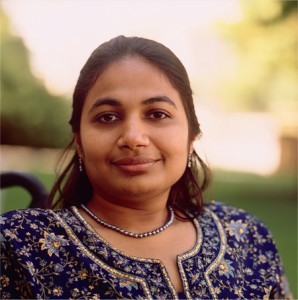A computer-science major feels at home in her field and helps other women feel the same.

“There’s this image of computer scientists being guys with nerdy, thick glasses that kind of deters many bright young women from getting into the field and breaking that mold.” – Neha Rungta
Not too many people get access to Google headquarters. But for Neha S. Rungta (BS ’04), a doctoral student in computer science (CS), an award from Google opened the door to one of the most powerful search-engine hubs in the world. Rungta’s service, leadership, and academic achievements propelled her into a group of 20 recipients of the $10,000 Google Anita Borg Memorial Scholarship, which is awarded to women pursuing careers in computer science and technology.
During a three-day retreat for the scholarship recipients at Google’s epicenter in Mountain View, Calif., Rungta wound through rooms full of lava lamps, rubber exercise balls, and ping-pong tables. “It amazed me how the people working there were so excited,” she says. While listening to the hum of people eagerly discussing their current projects—on red couches, in the free café, or from their densely clustered desks—she couldn’t help but catch their enthusiasm.
She also welcomed the chance to connect with the other scholarship winners and mingle with Google’s top female engineers, who spoke to the scholarship winners about the challenges women in technology face. “It was so motivating for me to meet with women who were doing so well in their field,” Rungta says. “There’s this image of computer scientists being guys with nerdy, thick glasses that deters many bright young women from getting into the field and breaking that mold.
“This never deterred me, though,” she adds, “but I guess I’m kind of different.”
Instead of being intimidated by the lack of women in her major at BYU, Rungta founded the Women in Computer Science Club—a place for her female peers to “have fun and learn, and not just work on school projects all the time,” she says. “There are sometimes things you just want to talk about with other women in CS because you’ve been through many of the same situations.”
Despite being the only female in most of her classes, Rungta is quick to explain difficult concepts to other students and is frequently the last one to leave the lab, where she spends hours solving computer-code flaws.
As an undergraduate Rungta led research that improved a program used by NASA. Her work—aimed at finding system errors faster—was presented at the NASA Ames Research Center. Michael D. Jones (BS ’95), an assistant professor in computer science, says Rungta’s improvements may even be used in the future to aid unmanned space missions to Mars.
“She’s very persistent and puts all her energy into accomplishing her goals,” says Rungta’s older sister, Vandana. “She’s always been that way.”
As a little girl growing up in India, Rungta played with her aunt’s computer—really just a glorified calculator. Her parents loved to buy the newest gadgets, so she was quickly exposed to the world of technology. When polio permanently confined her to a wheelchair at age 7, Rungta channeled her energy into her computer courses at school. She recalls Vandana returning home to explain “the new thing” called Internet. Although Rungta was somewhat puzzled by computer lingo then, at 14 she went on to write her first program—a handy paint tool for drawing houses.
Her achievement list has grown lengthy since then, but there’s no need to ask Rungta’s acquaintances about it. A Google search of her name brings up more than 600 hits—a telling history of her success.






